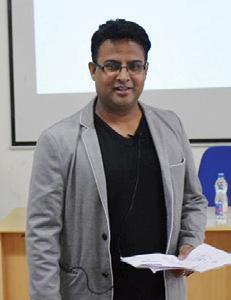







January 2023 Vol - 5 Issue - 1

Head of Advisory Board
Dr. Manoj Varghese, Ph.D
Managing Editor
Sarath Shyam
Consultant Editors
Dr. John Andrews
Anuja Mulmule
Emma James
Andrew Scott
Amrin Ahmed
Naomi Wilson
Stanly Lui
Roshni Rajagopal
Sabrina Samson
Keith Alexander
Editorial Enquiry: admin@highereducationdigest.com
Creative Consultants




Charlie Jameson
Manjunath R
Louis Bernard
Ajay Das
Rohith Poojary
Shirley David
Branding & Marketing Partnerships
Jennifer Anderson
Monica Davis
Suchita Sethy
Aakash Sawkar
Jessica Edword
Rachel Roy
Shubham Amle
Anna Elza
Stephen Donnell
Cathy Che
Partnerships Enquiry: admin@highereducationdigest.com
Free Subscription
www.highereducationdigest.com

International Representation


Americas 16192 Coastal Highway, Lewes, DE 19958, USA
Europe 27, Old Gloucester Street, London, WC1N 3AX, UK
Middle East & Africa P.O. Box 48299, Dubai Silicon Oasis, Dubai, UAE
Asia-Pacific Ramanashree Arcade, 18 MG Road, Bangalore – 560001, India
Higher Education Digest is a digital magazine published by Connecta Innovation Private Limited. All rights reserved. The opinions expressed in the content and pictures provided are those of the authors. They do not purport to reflect the opinions or views of the Connecta Innovation Private Limited or any of its members and we do not assume any responsibility. The publisher does not assume any responsibility for the advertisements, its content, pictures, and all representation of warranties made in such advertisements are those of the advertisers and not of the publisher.


Higher Education Digest is a Free Subscription digital magazine strictly not for sale and has to be strictly for internal private use only. Publisher does not assume any responsibility arising out of anyone printing copy of this digital magazine in any format and in any country and all matters related to that.

The Indian higher education system witnessed increased student enrolments in 2020 - 21.
The All India Survey on Higher Education (AISHE), 2020-2021, released in January 2023, showed a 7.5% increase in student enrolments across the country compared to 2019-20, with total student enrolments reaching 4.13 crore. Notably, female enrolment in higher education programs had increased to 49% of total enrolments in 202021 compared to 45% the previous year, and the Gross Enrolment Ratio for all enrolments (as per the 2011 Census) increased by over 2 points to 27.3. The Bachelor of Arts program is the most popular, with 104 lakh enrolments, followed by Bachelor of Science courses.

During the report’s release, the Education Ministry mentioned the increase in the number of universities and colleges in the last academic year. There were 70 new universities and 1,453 colleges to cater to the increasing demand. The
pandemic has also played a significant role, as we saw an increase of 7% in distance education enrolment. It was also interesting to see University Grants Commission (UGC) bringing a necessary draft regulation on the setting up and operating campuses of Foreign Higher Educational Institutions (FHEIs) in India. If we could implement it properly, no doubt, the entry of global universities will revolutionize and internationalize Indian higher education like never before.
With so much on the cards, 2023 will be an exciting year for followers of the high education system. Taking the discussion further, we have come up with a special issue featuring insights and opinions of academics and industry leaders. We hope our efforts will help all the stakeholders of the higher education system to make informed decisions. Enjoy Reading.
Sarath ShyamMr. Amulya Sah, PGD PM & IR, PG Diploma in PM&IR (XISS Ranchi)

Chief Human Resources Officer, Former Head HR group Samsung R&D Institute India,Transformative HR Leader, Change agent, Digitization facilitator, Engagement architect, Trainer and Diversity champion.


Dr. Varughese K.John, PhD, MBA, MPhil, MCom, LLB. Former Program Director, MS in Management Program, GSATM - AU

Mr. Dean E. Hoke, M.S, B.A Co-Founder of Edu Alliance, LTD, UAE and Managing Partner of Edu Alliance Group, USA

Major General (Rtd.) Dr. Sunil Chandra, VSM (Vishishta Seva Medal), Ph.D, M. Phil, MA, M.Ed, PGBDA
Ex-M D Army Welfare Education Society, ExCOO GEMS Education - India, Ex- Addl Dir Gen - Army Education, Mentor - Adventure-Pulse

Dr. Ajay Shukla, Ph.D, MBA, BE. Co-founder and Chief Strategy Officer at Higher Education UAE

Ph.D, MBA, BSc. Former Program Director of Ph.D, Recipient of Fulbright Fellowship Award & Dan Evans Award for Excellence and Writer columnist.
Shanthi Rajan (MSHRM, FHEA, AMCILT) Director, Institution Development, University of Stirling, RAK Campus, UAE.

Andrews Ed.D. Distinguished Fellow in Community College Leadership, Olney Central College, Illinois,USA


CEO at BMR Innovations, Ex Senior General Manager at Panasonic, LG, The Hindu, TATA, Author: Moment of Signal & The Roaring Lambs, Motivational Speaker & Leadership Consultant.


Ph.D (Marketing)., SFHEA (UK), MBA (Marketing), PGHRM, BA (Marketing & Economics)
Senior Director - Global Partnerships, Advisory & Consulting - Connecta®, Head of Advisory BoardHigher Education Digest® & K12 Digest®, Adjunct Faculty - Assumption University, Former CIO - Athena Education, Former Global Director TechnologyGEMS Education

WHAT MAKES PUBLIC RELATIONS A FASCINATING CAREER CHOICE Hemant Gaule, Dean, School of Communications & Reputation (SCoRe)


HOW B-SCHOOLS SHOULD HELP STUDENTS PREPARE FOR ESG AND DEI IN THE WORKPLACE
Radhika Shrisvastava, Executive Director, Fortune Institute of International Business, FIIB 36

A CAREER AS A PRODUCT ENGINEER, WE CAN’T IMAGINE OUR LIFE WITHOUT THEM
Nitesh Maan, Director of Engineering, dunnhumby India

LIBERAL EDUCATION- THE MEANS TO INCREASED EMPLOYABILITY?
Kritika Padode, Board of Governing Member, Vijaybhoomi University

20
TOP 4 REASONS WHY LIVE ONLINE LEARNING SHOULD BE ON EVERY PARENT’S RADAR
Anand Prakash, Co-founder & Head of Academics, Vedantu


28
LEVERAGING SYNCHRONOUS LEARNING IN VIRTUAL CLASSROOMS
Ranga Jagannath, Senior Director, Agora40

DOES TOP SCHOOLS REALLY SHAPE THE FUTURE OF STUDENTS
Seth, Chief Managing Director & Founder, Spherion Solutions & Brand Ventures
44
WHY OPT FOR AN IVY LEAGUE COLLEGE?
Kunal Mehra, International Educational Consultant, Crimson Education India


48
WHY SHOULD VCS FUND THE BURGEONING SPACE SCIENCE EDUCATION SECTOR?
Shivam Gupta, CEO & MD, Space Technology & Education Pvt. Ltd.
Dr. Saurabh Verma, Faculty and Placement CoordinatorMBA and BBA Programs, RICS School of Built Environment
Dr. Saurabh Verma is the Faculty and Placement Coordinator for the MBA and BBA Programs at the RICS School of Built Environment. He teaches data analytics and sustainability subjects at the School and actively engages in sustainability research and corporate training.

Over many decades, MBA education has been synonymous with business skills and knowledge, management, networking, and quick career progression. According to the latest India Skill Report, having an MBA degree is no more the key to landing jobs in India. Despite being ranked as the second most employable course, less than half of students (46.59 per cent) with an MBA degree have enough skills to be hired (Indian Express, 2021). Rest ends up with low skill – low pay jobs or go figure their career choice again. Redundant curricula and limited emphasis on pedagogical training, industry skills and competencies,
especially in low-tier management colleges and mushrooming private institutions, are the main reasons for the lack of employability skills. Hence raising questions about the relevance of an MBA degree in today’s time. In this changing business environment, an MBA aspirant should look at the below aspects while choosing the right program.
Post-Covid, the world business and industry have evolved with digital technologies, environmentalism, automation, community health, well-being, social impact, and innovative supply chain solutions. The skills
MBA Programs having a balanced emphasis on soft, technical, managerial, and new-age skills and behaviours delivered with relevant pedagogy are the need of the hour
and competencies needed to be successful in business are changing, and hence curricula of MBA need to change. The fact is that the MBA curricula need to future-proof the human skill requirements of industry and society. These days, MBA Programs expose learners to courses relating to Data and Digital skills in business, Corporate Sustainability, Business Analytics, and Innovation as mandatory subjects. Digital and Data literacy and excellent entrepreneurial skills are much-demanded skills in business. Successful MBA programs have embedded these skills and attitudes with relevant pedagogy in various courses and intensive workshops conducted on campus. MBA Programs having a balanced emphasis on soft, technical, managerial, and new-age skills and behaviours delivered with relevant pedagogy are the need of the hour.
One critical aspect that B-School needs to emphasise is creating the right environment and experience for the new Generation. Generation Z is looking for the right experience, motivation and regular feedback, and a communication loop to develop as newage business professionals, which online courses fail to provide. Another critical ingredient is creating key collaborations and partnerships to enhance student experience and skills. The new educational policy of the government of India allows students to pursue other programs along with fulltime degrees. MBA programs can now offer blended dual degree programs, certification skills-based programs along with MBA
MBA Programs with better flexibility, visibility, the right collaborations, industry connections, and accreditations will continue flourishing, and the ones that will stay opaque to changing times will perish
degrees. Programs must offer some degree of customisation in which students can choose from a bucket with a defined career trajectory. Of course, the blended programs and customised courses should be of value to the employer and add relevant skills and behaviours among MBA graduates. Relevant MBA programs have some part of the curriculum delivered online mode and the rest majorly delivered in an offline interactive mode.
Over the decade, industry-specific MBA Programs have been in high demand. It offers industry-relevant professionals and students the education of their choice based on their interests. The industry has been inclined towards having more sector-specific educated professionals. However, there is a need for more awareness of industry-specialized programs among human resource functions of various industries. There has been a realisation to bring industry human resource function, academia, certification bodies, accreditation agencies and admission seekers on a common platform to build awareness for industry specialised programs.
Accreditations and Certifications have also proven to differentiate between successful and non-successful MBA Programs. Accreditations like AACSB, ACBSP, IACBE, and WASC have been traditionally considered important benchmarks. Now sector or profession-specific accreditations like PMI, RICS, and ACCA are gaining popularity and
are a good choice for various industry-specific programs, which recruiters also value. As discussed earlier, key collaborations certifying MBA students can increase the confidence of students and the recruitment market.
Overall, we see that MBA Programs have been upgrading themselves with the changing times and business environment, which has kept them successful and relevant. There will always be a need and demand for business and management skills and changing times have made the requirements more specific and specialised. MBA Programs with better flexibility, visibility, the right collaborations, industry connections, and accreditations will continue flourishing, and the ones that will stay opaque to changing times will perish.
A word of advice to all MBA aspirants, don’t overdo your search on finding the right MBA program. In each tier, MBA Programs may be similar because of competitive forces and pressures. But focus on how open, flexible, and hungry you are to learn and transform with the chosen program and then give it your best. Instead of searching courses, it’s more about searching yourself, your likes, and strengths, early engagement with the program and having a clear goal of what you want from an MBA Program. The odds will be always in your favour if you are just open, hungry, and ready to transform. The very successful MBAs that I have seen are the ones who come with a lot of clarity and hunger to be successful and actively engage in most of the MBA school activities.
Hemant is an education leader based in Mumbai, India, and is passionate about education, policy, and media. After graduating from the Indian Institute of Management -Ahmedabad, he has counselled several private, social, political & government initiatives. He was a Co-founder & Director of Citizens of Accountable Governance, a team that spearheaded the national election campaign of India’s current Prime Minister Mr. Narendra Modi in 2014. After that, he has Co-founded (and is Dean of) India’s only institute dedicated to education and research in public relations – School of Communications & Reputation. In 2019 he became the first Indian to be conferred as a Fellow Accredited Public Relations Practitioners by ASEAN PR Network.
Public Relation is an exciting career option and a constantly evolving space in India. Defining PR in the simplest form would be, it helps businesses communicate their messages to the public, media, and stakeholders in an effective
way. It helps organisations uphold their prestige by managing their reputation and helping them in the times of crisis.
Over the years, the awareness and scope of PR has increased to a great extent and the versatility of this profession makes it a fascinating
Public Relations is practised greatly in countries like USA, Canada, Germany which opens the door to get an international exposure as well

career choice. One of the greatest advantages of this field is, it doesn’t matter what educational qualification or background one belongs to, they can always pursue PR, if they have an interest in communications. The other interesting facts about this profession are:
Being in PR opens many opportunities for a person to work with different brands and across various industries. Almost every company and business needs PR services to increase their brand awareness, enhance their reputation and increase customer engagement. The high demand of PR professionals has even resulted in the growth of in-dependent PR firms. It can also
help a professional explore other fields within the profession like Public Affairs, Public Policy, and Brand Management to name a few. Public Relations is also practised greatly in countries like USA, Canada, Germany which opens the door to get an international exposure as well.
Public Relations is an ever-evolving and dynamic profession, where everyday is a new day for the practitioners. It continuously embraces the changes in terms of new technological innovations and trends in the industry. With the smallest of changes in a client’s industry, the communication pattern changes completely. A major role of PR in any business is helping them at the time of any
One of the most interesting and rewarding experiences of working in the PR industry is to network and collaborate with other agencies for the campaigns and several other activities
crisis, and since communication plays a vital role in any crisis, it brings an opportunity for the professionals to showcase their talent and skills and help a brand in communicating their side of the story to the public and more necessarily, its stakeholders whose lives are directly impacted by the crisis.
In India, Public Relations as a profession has grown multifold in the past few years and is showing more growth with each passing day. In this industry, your professional growth is not limited to the years of experience you have, but it entirely depends upon the performance of an individual. The better you communicate and contribute towards an organisation through your hard work, dedication the more you succeed in this profession.
A PR practitioner’s day starts with reading and consuming a lot of news. Over the past few years, PR has evolved very much and demand for skills has upscaled. It involves all kinds of activities like content creation, creative writing, designing and with the increasing era of digital world, skills like influencer marketing and social media management also plays a crucial part in this profession. It will make you a master of communication and help you gain an immense pool of knowledge.
This profession gives you an opportunity to make a difference in the industry and society with the help of your hard work, creativity, dedication and discipline. A simple and smart communication strategy can contribute remarkably to the
company, organisation, stakeholders and most importantly to the brand’s reputation. You become an integral part of a brand’s journey in executing their narratives and help them establish themselves as thought leaders in their respective industries. Brand’s journey becomes your journey and getting recognition for the work that you have done is absolutely rewarding. In this industry, you create an impact and make a difference.
One of the most interesting and rewarding experiences of working in the PR industry is to network and collaborate with other agencies for the campaigns and several other activities. It is because some of the client’s works require you to expand the scope and diversify the approach for different projects, internally as well as externally. It also exposes you to a variety of industry, government as well as client’s events, where you get a chance to meet seasoned professionals across the industries and experts of various domains, which is a great opportunity to build connections , learn and gain knowledge from them. Such opportunities come across quite often in a PR professional’s life.
All these factors together make Public Relations a fascinating career choice. It’s exciting as well as challenging to be a part of the profession, but in the end it’s worth it for those who are really passionate about the communications field. This profession evolves you as a person from all aspects. Creativity is highly encouraged and you are free to explore your potential. You will always have opportunities to grow, learn and showcase your capabilities. With growing industry and expanding businesses, job prospects are brighter in India, in the PR Industry.
For ages, education was restricted to classrooms with blackboards, desks, and instructor-led teaching methods. Today, a considerable number of parents worldwide are opting to home-school or assist their children’s learning with online resources, because they have the freedom to choose what type of learning methods best suit the children. LIVE Online Learning is increasingly becoming a popular choice amongst all. It has torn down barriers of the traditional learning process and has given
space for students to learn more effectively and flourish, especially in the last few years. Online learning has proven to be a colossal improvement in the educational framework by opening doors for students to buck up in subjects that they find difficult, improve overall learning outcomes or even acquire specific skills by learning their favourite subjects more deeply.
Here are the top 4 reasons why parents should consider online learning to help children attain their educational goals:
Unlike the traditional methods, online learning proves to be a beneficial source to build critical thinking skills required to ace these exams
Anand Prakash is Co-Founder & HeadofAcademicsatVedantu,Vedantu - India’s leading online tutoring company which enables students to learn LIVE, with some of India’s best-curated teachers. Anand co-founded Lakshya in 2006, along with his childhood friends Pulkit Jain and Vamsi Krishna. Lakshya, their first educational venture which was a Test Prep company and later acquired by MTEducare, a listed company, in 2012.Vedantuistheirsecondventure together in education. Together, Anand, Vamsi and Pulkit are a perfect combination of teachers and edupreneurs who have personally taught and mentored more than 10,000 students.

1. Personalized learning – Online learning adopts a student-centric learning approach. Curriculums are designed based on all kinds of learners and learning styles in the online classroom, so every student can learn at their own pace and clear their doubts instantly, oneon-one with the teachers. Also, every year, the number of aspirants for competitive exams keep growing. Unlike the traditional methods, online learning proves to be a beneficial source to build critical thinking skills required to ace these exams. Parents can also find competitive exam-specific LIVE online learning platforms to ensure the child gets holistic training.
2. Greater flexibility – Online learning gives more autonomy to students who want to learn while sitting miles away. With online learning, students can learn from anywhere and everywhere, at any given time. This also saves them a lot of time enabling them to interact and learn more productively. Students can also clarify their concepts by revisiting the pre-recorded online sessions whenever they may require.
3. Gamification and interactive environment – Gamification through Artificial Intelligence (AI) provides simulation of concepts
which helps children understand a topic more thoroughly. Features in online learning platforms like incentive-based rewards, level advancement through badges, leader boards, fastest finger first, appreciation through dhols and the likes, help drive student engagement, thus, increasing their knowledge base.
4. Affordability and accessibility to quality teaching – Thanks to technology, the infrastructural cost has been lowered and helped online learning reach students at scale. Where quality teaching could not reach, now, students can easily access quality education from India’s top teachers at a much affordable price because of greater accessibility.
Online learning offers endless opportunities to learn new topics, experience customized learning at the student’s own pace and get access to the best teachers from across the country. With this new normal, even with schools re-opening, we are observing a collaboration of online and offline channels to create hybrid learning approaches that provide students with ubiquitous content and learning. Online learning has not only brought forward a new world of education, but also has the full potential to become this student generation’s new favourite classroom.
Where quality teaching could not reach, now, students can easily access quality education from India’s top teachers at a much affordable price because of greater accessibility



Radhika Shrivastava is an entrepreneur in the higher education sector in India. With a mission to bridgethegapbetweenemploymentandemployability,andproductionofscholarshipthatinforms management and the actual practice of management, she is currently at the helm of Fortune Institute of International Business (FIIB) - a top 40 B-School located in New Delhi, India. FIIB, an AACSB Member school, offers MBA and Doctoral level programs as well as several programs for executive education. It is approved by the AICTE, accredited by the NBA (for PGDM) and EDAMBA (for Doctoral Programs), and given equivalence by AIU.
There was a time when MBA courses covered game theory, securities valuation, and mergers and acquisitions. However, social entrepreneurship, impact investing, and climate finance are the trending hot topics at the moment. As
of now, the importance of ESG and DEI in the classroom is always on the minds of deans around the world; and why not? Because bringing socially responsible people with diverse backgrounds and cultures together enriches the business school experience, enabling them to gain valuable
Business school students are the leaders of tomorrow, and integrating ESG and DEI into business leadership is increasingly critical for overall, longterm success

perspectives and skills that can be transferred into the workplace.
What are ESG and DEI?
Environmental, social, and governance (ESG) data reflect the externalities an organization is generating for the environment, society, and corporate governance. Diversity, equality, and inclusion (DEI) is an ethos that recognizes the value of diverse voices and emphasizes inclusivity and employee well-being as central facets of success. Both are integral parts of the social fabric and determine a company’s worthiness and societal value. Moreover, they both serve as a framework for conscious consumerism and help businesses attract investors, retain customers, and improve financial performance.
Why should B-Schools care for ESG and DEI?
Business school students are the leaders of tomorrow, and integrating ESG and DEI into business leadership is increasingly critical for overall, long-term success. B-schools are modifying their courses to meet the demands of students and employers as the number of jobs focusing on environmental, social, and governance issues increases. As a result, the environmental, social, and governance (ESG) including diversity, equality, and inclusion (DEI) movement is sweeping through corporations and business schools alike.
How should B-Schools prepare students for ESG and DEI?
It’s time to learn to walk the DEI & ESG talk! The next-generation students are likely to be interested in schools that focus on ESG efforts,
whether through corporate partnerships, values statements, or other activities. Diversity in our programs, our faculty, and our student body is more vital to our success than ever before. It is for this reason that business schools are becoming more sensitive to the need to cultivate leaders and faculty who reflect all aspects of human existence and ensure equitable educational access for an increasingly diverse population. The following are some ways business schools are preparing their students for ESG and DEI
Integrating business, community, and the environment into a curriculum is indeed of the utmost importance. Sustainability management should be integrated into MBA programs. However, it’s one thing to put sustainability on the curriculum, and another to practice what you preach. In addition, to ensure equal representation, colleges should introduce women empowerment cells, inclusion councils, and other support groups to educate students about sustainable development goals.
It is easy to understand ESG & DEI principles, guidelines, and structuring methodologies thanks to a variety of well-established resources. Business schools can ensure that they incorporate practical DEI & ESG preparedness into their educational programs by following the UN Sustainable Development Goals (SDGs), Human Rights guidelines, CDP disclosure system, and ISO Global Reporting Initiative (GRI) guidelines, as well as being consistent with their commitments to gender equality and zero waste.
Materiality assessment & stakeholder engagement:
A successful ESG and DEI strategy or report requires a Materiality Assessment and Stakeholder Engagement to identify the environmental, social, and governance issues that matter most to the organization. Students should be conditioned for ESG & DEI materiality research and developing a clear vision. Also, a periodical assessment of efforts should be tracked on a monthly or quarterly basis for a better understanding.
Well-rounded experiential learning: A superior business education program emphasizes internships and experiential learning to allow students to gain practical experience. Particularly when it comes to cultivating talent in the fields of ESG and DEI, this is true. Additionally, more
ESG business implementation research, thesis development, rigorous training, and professional development avenues are needed to build the skillsets required by the modern workforce and future leaders.
Events & Collaborations: Higher education and industry can work together to develop energized students into fulfilling careers. As part of their commitment to shaping the transition to energy in alignment with their values, students should be encouraged to collaborate with local companies, renewable innovators, and social events. Aside from social initiatives, events like annual gatherings, inter-college fests, multicultural clubs, and group activities ensure that every student represents their college regardless of their culture, religion, or interests.
A successful ESG and DEI strategy or report requires a Materiality Assessment and Stakeholder Engagement to identify the environmental, social, and governance issues that matter most to the organizationINDUSTRY PERSPECTIVE
Consider a virtual classroom setup: The teacher prepares an engaging lesson incorporating diverse content. Students log in, are eager to learn, and enjoy the spontaneous interaction that makes classes interesting. Isn’t this how we envision virtual learning to be? However, the reality can be quite different. Several problems emerge. The teacher uses a whiteboard, but the illustrations appear several
seconds later. Students ask questions in the chat, but there is a lag. And the teacher has moved on to the next point. The teacher tries on-camera lecturing—but there’s a disconnect between the video and audio. The class is not the seamless experience the teacher and students expected. What matters is how well they’re synchronized with many individual components in play during a live lesson. The ability to deliver
The ability to deliver a high-caliber virtual learning environment will determine its success; if the platform’s features are out of sync, it will be useless
Ranganath is the DirectorGrowth for Agora. He is responsible for the overall business and operations of Agora.io India and the SAARC region. His directive includes growing market share and driving healthy ecosystem growth among both partners and customers in the region. He comes with a strong Sales & Business Leadership background with over 25 years of in-depth industry experience. Prior to joining Agora.io, Ranganath cofounded Fetchon.com, worked with Syniverse Technologies, Verisign Inc, EFI, Unimobile and Micros Fidelio India in various capacities. He holds an Executive MBA from Narsee Monjee Institute of Management Studies and is a graduate in Arts from Osmania University along with a diploma in Hotel Management and Catering Technology.

A quality monitoring system may modify poorquality servers, automatically fix problems, and optimize the network to keep latency well below 400ms, the accepted industry benchmark for a satisfactory user experience
a high-caliber virtual learning environment will determine its success; if the platform’s features are out of sync, it will be useless.
A virtual classroom is a demanding use case for real-time engagement due to the many participants and diverse locations. Amidst this virtual setting,
teachers and students must maintain the same interactivity level as before. When technology foils teachers’ plans, they’ll quickly reject the platform as inadequate. A developer’s solution is likely to lose customers soon if it develops a reputation for having out-of-sync components. Hence, synchronization is a crucial component of any virtual classroom solution.
Synchronous online classrooms can allow for real-time messaging and enable teachers to share PowerPoint slides, Word or PDF files, or audio/video files with students synchronously. Teachers and students can even write things collaboratively on a whiteboard in the virtual online classroom.
It is essential to have a solution that can perform in different settings, such as oneto-one classrooms, small classrooms, lecture halls, breakout classes, and hybrid classrooms.
To deliver the full range of virtual classroom capabilities at the best available quality—without the synchronization issues of a multi-vendor strategy its crucial to include the following characteristics:
● Audio – High-fidelity, HD-quality sound allows clear communication with ultra-low latency.
● Video – HD-quality video and smooth, uninterrupted 48kHz sampling up to 192 kbps bitrate bring participants face-to-face from anywhere, on any device.
● Chat – Chat and signaling with ultralow latency and high concurrency provides additional opportunities for classroom interaction. Offline caching enables students and teachers to access messages even when disconnected.
● Whiteboard – Teachers can use sophisticated tools like text editors, Float Bar, graphics tools, shapes, laser pointers, and hand tools to augment display content and provide interactive engagement and communication.
● File sharing – With dynamic file sharing, teachers and students may effortlessly exchange documents throughout a lesson, such as lesson plans, homework assignments, and more.
● Recording – Virtual classroom streams may be stored locally or on the cloud. Sessions can also be pre-recorded for students to view or listen to later.
Each virtual classroom component should provide top-notch availability and performance in any network condition on any device. A quality monitoring system may modify poor-quality servers, automatically fix problems, and optimize the network to keep latency well below 400ms, the accepted industry benchmark for a satisfactory user experience.
For reliable coverage worldwide, the platform should have several data centers so that participants in a virtual classroom may connect to the network with low latency, quick data transfer, and high performance. These are prerequisites for an excellent virtual classroom experience.
Virtual classrooms that can be online very quickly and aid businesses in swiftly seizing possibilities have a prolonged future. Companies creating learning management systems, massive open online courses (MOOCs), tutoring services, language learning programs, and other virtual learning goods should concentrate on company development without grappling with the intricate mechanics of Real-time Engagement.
By building your platform to deliver the full range of real-time engagement capabilities instructors and students depend on, with the closely synchronized experience needed for effective learning, you can position your business to thrive in the new world of online education.
KritikaPadodeBhandariisanalumnusofNationalLawUniversity,Delhi.Shehaspracticed extensively in the Karnataka High Court, Delhi High Court and Supreme Court of India. She is now assisting with the setting up of Vijaybhoomi School of Law and helping curate the curriculum for the same.
When one introspects and observes the world we live in today- it is not difficult to miss the massive changes technology has brought to our lives. With the influx of applications such as- instagram, Facebook, Twitter our ways to communicate and lifestyles stand drastically altered. We are more accessible and our lives more public in the current times.
Access to information and knowledge has seen a revolution of it’s own and is no longer asymmetric. In fact, a person of any age belonging to any part of the world can obtain any information related to any topic in the globe as long as they have a smart phone.
All services related to convenience including watching the latest release, chatting with a friend in a distant land, buying
With ever increasing access to information and knowledge retention being no longer an important skill linked to employability- education needs to focus on promoting a skill set that will gain prominence in the times to come

regular or exotic groceries are pretty much on our fingertips.
Seeing these changed circumstances, it is not unknown to us that technology has usurped many human jobs. Many tasks that, were research or calculation, intensive can now be easily carried out by, advanced machines. It is no surprise that with Google and the internet reaching every household- knowledge retention is no longer a super power that people need to have.
With all these changes happening right under our noses- the big question is what are the skills that will increase our student’s employability in the future and which is an apt education model that allows students to pick up these skills to suit the changing times?
With ever increasing access to information and knowledge retention being no longer an important skill linked to employabilityeducation needs to focus on promoting a skill set that will gain prominence in the times to come. As machines advance and get more intelligent by the passing day, education needs to focus on imparting skills for students to navigate through new challenges. Future education needs to promote creativity, which will take centre stage as left-brain functions are aced by machines. With the virtual world taking over education needs to help students find their emotional anchor to happily live life and be empathetic. As problems like Covid are one of the many inter-disciplinary issues our students
will face- we need to promote inter-disciplinary thinking and innovative problem solving.
With this being the context- I would place my bets on liberal education to be one of the stronger models that will promote enablement of students to lead a productive and happy life in the future.
With an overload of information coming our way liberal education helps students sift out the truth from a barrage of data through multiple perspectives such as artistic, quantitative, humanistic, historic, scientific etc.
A liberal education is focused towards building knowledge, skills, abilities, and, values in students by, encouraging a spirit of free inquiry and promote independent thinking. This approach promotes innovation and creativity equipping students with the tool kit to identify a problem and creatively arrive at a solution for the problem using the help of technology and domain area experts. With life expectancy going up, a holistic education model like liberal education prepares students for multiple careers and makes them more adaptable to changes, which we cannot even fathom.
To conclude- the evolved definition of liberal education that exposes students to STEM education along with philosophy, arts, humanities and technology education is the panacea to improve employability of future generations to come and create the next generation of innovative solution- providers.
A liberal education is focused towards building knowledge, skills, abilities, and, values in students by, encouraging a spirit of free inquiry and promote independent thinking
Today’s learners and faculty have high expectations, requiring an integrated and exible learning experience that operates seamlessly and intuitively. By partnering with Blackboard, you can enhance your institution’s brand by providing students and faculty with a holistic and integrated modern learning ecosystem.
Blackboard brings together the technologies and services you need to lead your institution through this digital transformation.

To learn more, visit blackboard.com
An MBA from IITDelhi and M.S. in Computer Science and Engineering from University ofTexas, Nitesh carries nearly two decades of experience in Enterprise and SaaS environments leading globally distributed cross functional technology teams building software products for international markets. He is always keen to apply technology to find innovative solutions to complex problems. At times that requires gaining insights into new technologies. Nitesh Maan learned ML/AI from IIIT Bangalore when he wanted to leverage computer vision to solve the problem of identification of nitrogen deficiency in crops through a technology-enabled solution applied at scale.
Did you know about 80% of smartphone users check their phones within 15 minutes of waking up? This is according to IDC research that surveyed 7000 people between the age of 18 and 44 who own either iPhone or Android smartphones.
The apps used to fall into several categories including social networking, news, email, etc. Clearly, software products dominate day-to-day lives in the 21st century.
Declining costs of storage, computing, and data as well as increasing teledensity and broadband
Open positions in your domain of interest provide a fair insight into technologies you should start learning as you prepare yourself for a role with your preferred employer

penetration year on year has accelerated the usage of software products not only within enterprises but also in consumer space.
The result is the increasing demand for product engineers and hence, a good career option for aspirants in the field.
quality assurance, and launch. In short, they are full-stack engineers with experience across all stages who have good communication skills to engage with a diverse set of stakeholders including technical and non-technical. They also possess a deep understanding of the business domain and the customers who are expected to use their products. This puts them in a strong position to ensure not only are they building the right product they are also building the product right.
Software Product Engineers are involved in all stages of the product development lifecycle from ideation, prototyping, architecting to development,
So how can one become a product engineer? A degree in computer science and engineering is highly recommended to learn the building blocks of software development, however, it is not a prerequisite. Follow industry trends to understand ways in which different businesses are leveraging technology to gain a competitive edge to stay ahead of the curve. India has a thriving start-up landscape ranking third globally just after China and the United States. Collectively, they have pioneered a range of business models powered by innovative ideas across several sectors such as education, finance, logistics, and eCommerce to name a few. While many of these are examples in the Business to Consumer (B2C) space there is no dearth of technology-enabled innovations championed across the Business to Business (B2B) space. Open positions in your domain of interest provide a fair insight into technologies you should start learning as you prepare yourself for a role with your preferred employer.
As a product engineer, it is highly recommended to have strong technical skills including software development skills, best practices, and processes along with soft skills.
A robust architecture is like glue which ensures that different components of the product integrate seamlessly to meet customer needs effectively and reliably
On the job, learn technologies useful across both front and back-end layers of the product and volunteer for tasks that help you develop hands-on experience implementing them on the products being developed by your team. A robust architecture is like glue which ensures that different components of the product integrate seamlessly to meet customer needs effectively and reliably.
Hone your software architecture skills as an extension to your full-stack expertise. Prototyping is useful to test initial hypotheses across technology choices, market segments, and product fitment. This makes Agile techniques a must-have for product engineers. It allows you to break down execution into iterative deliverables reducing the feedback cycles from internal stakeholders and most importantly your customers making it less costly to go about course correction in terms of reprioritising what’s more valuable to them. It is also a great opportunity to get an understanding of your customers’ psychology which is another quintessential soft skill for a product engineer.
Change is the only constant that holds as true (if not more!) in technology as is in any other domain. New opportunities are emerging as use cases grow for Artificial Intelligence, Augmented/Virtual Reality, Blockchain, and Metaverse to name a few. There are also new mediums to consume software products beyond desktops and web browsers. Smartphones are already a popular medium to log online and at times first for many users, especially in Tier 2 and Tier 3 cities.
At the end of Q2, 2022 there were more than 5 million mobile apps across Android and iOS app stores and a user base of more than 3 billion worldwide. Wearables are seeing rapid adoption and are frequently used in tandem with smartphones. ‘Things’ are getting smarter with sensors and connectivity options. Product engineers must follow these developments closely to conceive use cases for their own products and/or create new use cases that delight the customers with a reimagined user experience achievable through these emerging technologies. This will require a good understanding of how these technologies work and integrate with existing technologies and platforms.
There are a host of online platforms with coursework covering these topics. In addition, the Learning & Development programme offered by your employer is often an excellent source of premium content.
In summary, Product engineers are E-shaped professionals i.e., they have expertise in several technologies that cut across the software application layers. They have strong work experience in a related domain and get involved in all stages of product development which makes good communication skills a vital asset in addition to problem-solving and customer psychology understanding. This full-stack mindset gives them an edge over others to grasp emerging technologies which ultimately translates into more career opportunities and growth. Demand is high and product engineering remains a coveted career option given the opportunities that exist today and those continuing to emerge and are expected to become available in times ahead.
“School” is a place that forms the most crucial years of a person’s life. It can be the reason for a child’s success or failure. The school and its faculty members play a significant role in shaping a child’s personality and positively opinionated mindset and behavior, in addition to fostering academic excellence.
Furthermore, students are taught to share their space with their peers, broaden their horizons, and appreciate the importance of family and friendship at school only.
However, selecting the right school for your child is just as crucial as educating them. A good school with the right faculty will not only ensure academic success but also influence your child’s future career prospects.
The age of 6 to 18 years is where a child develops physically, emotionally and cognitively, thus taking care of a child during these years is the paramount concern
Dr. Siya Seth, with more than two decades under her belt, has been a driving force behind the success of Spherion Solution Private Limited and its six brand endeavors, which include Skoodos, Skoodosmart, and SkoodosBridge. She brings a plethora of cultural knowledge and business acumen to her position as the organization’s CMD. She made her debutintheeducationsector,andfrom there she moved on to successfully implement social sector projects in the areas of skill development and female empowerment with organizations like the UNDP, the World Bank, and the National Skill Development Corporation (NSDC) in 19 states across India and Kenya, resulting in the professional growth and development of over 68945 youngsters.

The age of 6 to 18 years is where a child develops physically, emotionally and cognitively, thus taking care of a child during these years is the paramount concern. The most important factors that a school should consider are-
1) Children are inherently inquisitive in nature and a good school must ensure that the studies are interesting and appeal to this curiosity of the child. A monotonous lesson may be learned by a student but true understanding comes from building upon lessons by giving relatable examples.
2) The emotional development of a child is not yet fully done, thus, making them awkward and insecure. A proper guidance is very important as a socio-emotional lesson will also help a child in future by helping
them maintain the work-life balance, life stress and much more.
3) Schools create a cohesive, supportive environment that imparts more than just academic knowledge through interactive learning opportunities and community-based activities, thereby enhancing the physical stamina and mental health of children.
For instance, the best boarding schools for fifth graders organize inter school competitions to instill in their students a sense of belonging and a sportsmanlike spirit, which will help them deal with rejections and failures in the future.
A School that has all these basic components can be said to be the right school for your child.
The top-schools usually focus on a welltrained staff and better facilities for games and other activities. It can constitute a great experience for the child but on the other hand a top school can also lead to inferiority complex and feeling of insecurity in a child who might feel left out in the midst of all the advanced settings.
Choosing a school for your child is certainly a tedious process and instead of just following the trend it is important to ensure that your child is happy and is not a victim of common issues like peer-pressure, inferiority complex etc. as these experiences turn into trauma in later stages of life.
A parent should keep the above points in mind while choosing the perfect school for their child. It’s important to remember that it’s actually a school that will help him or her become well-rounded and responsible in the long run.
Schools create a cohesive, supportive environment that imparts more than just academic knowledge through interactive learning opportunities and community-based activities, thereby enhancing the physical stamina and mental health of children

Each year, thousands of ambitious high school students dream of studying at one of the Ivy League universities, and this number only seems to be growing year on year. In the United States, the eight Ivy League universities - Harvard, Yale, Princeton,
Brown, Dartmouth, Columbia, Cornell, and the University of Pennsylvania, are among the oldest institutions of higher education. These universities are known worldwide for their beautiful campuses, esteemed faculty, diverse communities, wide-ranging resources, and of course — the many opportunities graduates
Alumni connections are often the first postgraduation job source and Ivy Leagues are renowned for their solid and welcoming alumni networksInternational
KunalMehraistheInternational Education Consultant for Crimson’s India office. He has spent over 16 years in the Education sector across different verticals including holding positions at some of the world’s leading education and technology companies such as Coursera and the College Board. At the College Board, Kunal was the Director South Asia at the College Board, looking over the expansion of College Board programs such as SAT and AP in India. Kunal was also part of the core founding team at a Law and Technology company, Rainmaker, which built the Bar Exam in India and also built one of India’s first asynchronous learning platform - myLaw. net. Kunal graduated with a bachelor’s in economics from University of Delhi and had admits from the Wharton School (MBA) and the North-western University (Accelerated JD).

enjoy after earning their degree. From Columbia’s bustling New York City campus to Dartmouth’s quaint New England locale, each of the Ivies offers a one-of-a-kind student experience.
Let’s delve a little deeper into what students stand to gain from an education at the Ivy Leagues.
An Ivy League education grants you access to research and studying materials crafted by the most brilliant minds. Professors at Ivy League universities are subject matter experts in their specific topics and issues of import. They’re encouraged and, most times, expected to perform research on these topics for the university, while generating new theories in topics students are already studying, providing them with leading-edge and timely research.
With graduates dating back to the 1700s, one of the most beneficial aspects of the Ivy League education is the power of the alumni network. This network consists of all graduates from a particular university, well beyond college friendships. Alumni connections are often the first post-graduation job source and Ivy Leagues are renowned for their solid and welcoming alumni networks. Being an active member of these networks of an elite group of graduates, can significantly impact your life and the future of your career. Furthermore, you can leverage this solid networking by obtaining internships that may lead to future employment opportunities at
world-renowned companies and agencies, well before graduating.
One of the key aspirations for students, throughout their graduation, is to secure that jump start in their career. An Ivy League education can give you a head start in highly competitive fields like finance, law, and business consulting. These universities and their alumni networks have strong relationships with top global companies, who understand that the Ivies house some of the best and brightest students, so they’ll hire directly from the source.
Multiple studies and industry sources have confirmed that graduates with a bachelor’s degree had an average income of $54,700 and those with a master’s degree or higher had an income of $65,000 per annum. Attending a university in the Ivy League can significantly improve your potential to secure an above-average salary.
An Ivy League university admission is highly valuable and can be accomplished with dedicated effort and a well-designed strategy. Candidates need to display that fervor and passion for the subject that is evident from their knowledge and research in their chosen field of study. A balanced portfolio of this passion along with extracurricular activities, leadership qualities engagement with the community ensures higher chances of admission in these universities. Remember, the Ivy Leagues are not looking for well-rounded students. They want students who will change the world.

The battle of space started between two superpowers, but today over 90 countries are operating in space; while only 12 Astronauts have been to the moon, and only 500 Astronauts have travelled to Space out of a massive 8 Billion Population. Over the past few years, space tourism and education is
gaining traction in all fields. Be it billionaires like Jeff Bezos and Richard Branson making headlines with their successful space flights, hinting at a budding space tourism business or the Indian Space Research Organisation’s (ISRO) incredible MARS mission; the space sector and its economy is booming day by day.
From seeking everything from scientific advances to potentially lucrative business opportunities, investors are scouting to conduct a socio-economic impact audit on the Indian space programmes, while adding a new and unique category of investment in their funds portfolio
Shivam Gupta, CEO & MD at Space Technology & Education Pvt. Ltd. has been an active stakeholder of the organisation since 16 Years and in 2022 joined as CEO of the organisation for building strong business and marketing strategies with dynamic leadership for making the conglomerate a global powerhouse in the field of Education and Tourism through Astronomy, Space Science, STEM and Metaverse. Shivam has lead variousmarketingprojectsinRealEstate and pursued his Metaverse startup for building an experiential economy. His vision towards MarTech has helped companies achieve higher sales and stronger brand value. Shivam has worked with the likes of Times of India, Hindustan Times, MY FM, GD Goenka University, GD Goenka World School and other prominent schools of India for marketing promotions, Metaverse developments, Educational Programs and AstroTourism. Shivam is a Commerce graduate and holds a Bachelors Degree in Global Management (Finance) from Regents University London, United Kingdom.

The Indian space science sector which has completed more than 200 missions over the past five-plus decades, developed multiple cutting-edge technologies and managed to complete MARS mission in a budget of a movie, has managed to trigger interest in a host of private-sector investors that are now
investing in space programmes of private companies. From seeking everything from scientific advances to potentially lucrative business opportunities, investors are scouting to conduct a socio-economic impact audit on the Indian space programmes, while adding a new and unique category of investment in their funds portfolio. It has been estimated that in 2022 so far, funding to private players in the space sector has jumped a whopping 61.5 percent, soaring to $108.52 million compared to $67.2 million in 2021 and currently 104 space start-ups and 368 space tech companies are actively working in the sector according to official data
With all the happenings in the Space sector, it can certainly be described as a “space renaissance”, a period in which once called a “domain of giants” is now becoming a space for everyone due to technological innovations that are significantly reducing costs and creating new capabilities. The newest crop of space entrants is thriving on discoveries that are leading mankind to opportunities to find new materials and methods, better technical systems, more efficacious instruments, and new laws in nature.
It is a result of such rapid advancements that the National Education Policy is emphasising on providing the grassroots level an integral understanding of Space Science and Astronomy. As it will not only result in the development and transmission of knowledge in all relevant fields of space science and technology, it will also enable the students
As an academic field, space science education has a tremendous amount of potential but surviving on just government funds is becoming perilous for the sector
to enhance their understanding about our universe’s vastness and learning from handson experiences through indigenous Space and STEM kits. The gen-z can potentially create a greater impact and with a clear perception on the preservation of Earth’s environment as it is evident that Earth is a single-point failure for humanity and we need alternatives for survival. Thus, the education on Space Science is ever so necessary and important at schools all around the world.
As an academic field, space science education has a tremendous amount of potential but surviving on just government funds is becoming perilous for the sector. However, the rise of India’s own “SpaceX-like ventures” is increasing the private sector’s active participation in the industry.
The
the sky - In recent years, space-based technologies have become an important factor to reach, bolster, connect and combat various implications through more secure and effective means. Every year, numerous innovations generated by space programmes can be used in everyday lives and can be applied to have better access to better education which means better life prospects and opportunities for human beings. The low-cost launch, low-cost miniaturized satellites and the capability of launching hundreds or even thousands of satellites in a single constellation is opening new doors for venture capitalists to explore. Plus, multimillion dollar industries like climate and sustainability, connectivity, autonomous mobility, smart cities, and defence are big
opportunities that are now being addressed from this digital infrastructure in the sky.
Raising the bar of Space Education and budget: To boost the participation of young people and students in the Indian space sector, government initiatives like the Atal Tinkering Lab (ATL) space challenge or developing world-class learning facilities and space museums, has helped students to learn the basics of space technology, increased interest and curiosity in the field, and created a path to pursue career in Science, Technology, Engineering and Mathematics (STEM) to help and develop critical thinking and problem-solving abilities.
The rise in the budget is also attracting many private investors as the Indian Space Research Organisation (ISRO)’s annual budget has crossed $1.45 billion (₹10,000 crores) and is poised to reach USD 12.8 billion by 2025. However, demand for spacebased services is far greater therefore, private sector investment is critical and eventful.
Experiential learning means valuable future opportunities: The time calls for Grassroots to learn via experiential methods of Mixed Reality consuming of Augmented Reality (AR) and Virtual Reality (VR), students can easily be taught about Space science via simulation of Rockets, Robotics, Astronaut experiences, etc, which can exponentially grow their curiosity and passion. Imparting Space knowledge at schools has been low due to factors such as limited availability of content and Space being an expensive sector, but with AR &
VR possibilities, the real to life experiences would help schools and students to discover a new dimension of education. Thus, this makes investing in the Space education sector a great initiative as the tailwind is strong.
The need of the hour is to encourage investments in the Space Science Education sector so that the future of the nation is secured by building critical capabilities and capacity. The investment in this sector is not only leading to the use of innovations
like AI and Robotics that are sub-assets of Space Science Technology but the budding space industry is also creating an enormous amount of wealth and thousands of associated jobs and most importantly creating scope for Space exploration and resources research. Also for rectifying the inequalities in our educational system, institutions, businesses, and governmental entities, forward-looking academics must work together and build futuristic educational aids and content. As only then humanity can “go where it has never gone before”.
The need of the hour is to encourage investments in the Space Science Education sector so that the future of the nation is secured by building critical capabilities and capacity

